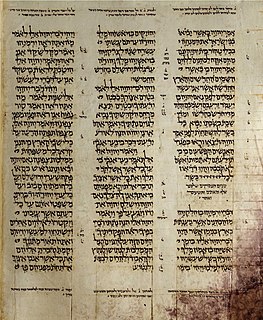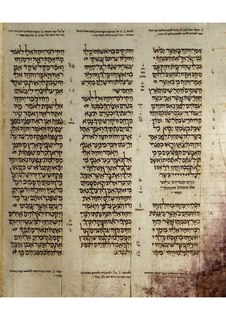
Jeremiah 4 is the fourth chapter of the Book of Jeremiah in the Hebrew Bible or the Old Testament of the Christian Bible. This book contains prophecies attributed to the prophet Jeremiah, and is one of the Books of the Prophets. Chapters 2 to 6 contain the earliest preaching of Jeremiah on the apostasy of Israel.

Jeremiah 29 is the twenty-ninth chapter of the Book of Jeremiah in the Hebrew Bible or the Old Testament of the Christian Bible. It is numbered as Jeremiah 36 in the Septuagint. This book compiles prophecies attributed to the prophet Jeremiah, and is one of the Books of the Prophets. This chapter records several "letters reported by the third-person narrator": from Jerusalem, Jeremiah sent a letter to the people in the Babylonia exile and he responded to a letter about him from Shemaiah.

Jeremiah 47 is the forty-seventh chapter of the Book of Jeremiah in the Hebrew Bible or the Old Testament of the Christian Bible. This book contains prophecies attributed to the prophet Jeremiah, and is one of the Books of the Prophets. This chapter is part of a series of "oracles against foreign nations", consisting of chapters 46 to 51. In particular, chapters 46-49 focus on Judah's neighbors. This chapter contains the poetic oracles against the Philistines.

Jeremiah 8 is the eighth chapter of the Book of Jeremiah in the Hebrew Bible or the Old Testament of the Christian Bible. This book contains prophecies attributed to the prophet Jeremiah and is one of the Books of the Prophets. Chapters 7 to 10 constitute an address delivered by Jeremiah at the gate of the Temple in Jerusalem.

Jeremiah 10 is the tenth chapter of the Book of Jeremiah in the Hebrew Bible or the Old Testament of the Christian Bible. This book contains prophecies attributed to the prophet Jeremiah, and is one of the Books of the Prophets.

Jeremiah 11 is the eleventh chapter of the Book of Jeremiah in the Hebrew Bible or the Old Testament of the Christian Bible. This book contains prophecies attributed to the prophet Jeremiah, and is one of the Books of the Prophets. This chapter includes the first of the passages known as the "Confessions of Jeremiah".

Jeremiah 13 is the thirteenth chapter of the Book of Jeremiah in the Hebrew Bible or the Old Testament of the Christian Bible. This book contains prophecies attributed to the prophet Jeremiah, and is one of the Books of the Prophets.

Jeremiah 14 is the fourteenth chapter of the Book of Jeremiah in the Hebrew Bible or the Old Testament of the Christian Bible. This book contains prophecies attributed to the prophet Jeremiah, and is one of the Books of the Prophets.

Jeremiah 17 is the seventeenth chapter of the Book of Jeremiah in the Hebrew Bible or the Old Testament of the Christian Bible. This book contains prophecies attributed to the prophet Jeremiah, and is one of the Books of the Prophets. This chapter includes the third of the passages known as the "Confessions of Jeremiah".

Jeremiah 18 is the eighteenth chapter of the Book of Jeremiah in the Hebrew Bible or the Old Testament of the Christian Bible. This book contains prophecies attributed to the prophet Jeremiah, and is one of the Books of the Prophets. This chapter includes the fourth of the passages known as the "Confessions of Jeremiah".

Jeremiah 19 is the nineteenth chapter of the Book of Jeremiah in the Hebrew Bible or the Old Testament of the Christian Bible. This book contains prophecies attributed the prophet Jeremiah, and is one of the Books of the Prophets.

Jeremiah 20 is the twentieth chapter of the Book of Jeremiah in the Hebrew Bible or the Old Testament of the Christian Bible. This book contains prophecies attributed to the prophet Jeremiah, and is one of the Books of the Prophets. This chapter includes the fifth of the passages known as the "Confessions of Jeremiah".

Jeremiah 38 is the thirty-eighth chapter of the Book of Jeremiah in the Hebrew Bible or the Old Testament of the Christian Bible. It is numbered as Jeremiah 45 in the Septuagint. This book contains prophecies attributed to the prophet Jeremiah, and is one of the Books of the Prophets. This chapter is part of a narrative section consisting of chapters 37 to 44. Chapter 38 records the petition from the royal officials to punish Jeremiah, his confinement in the dungeon or cistern and his rescue from there, although he remains in captivity, a secret conversation between Jeremiah and King Zedekiah, and the inquiry of Jeremiah by the king's officials.

Jeremiah 44 is the forty-fourth chapter of the Book of Jeremiah in the Hebrew Bible or the Old Testament of the Christian Bible. This book contains prophecies attributed to the prophet Jeremiah, and is one of the Books of the Prophets. This chapter is part of a narrative section consisting of chapters 37 to the present one. Chapters 42-44 describe the emigration to Egypt involving the remnant who remained in Judah after much of the population was exiled to Babylon. The Jerusalem Bible describes this chapter as "the last episode of Jeremiah's ministry".

Jeremiah 26 is the twenty-sixth chapter of the Book of Jeremiah in the Hebrew Bible or the Old Testament of the Christian Bible. It is numbered as Jeremiah 33 in the Septuagint. This book contains prophecies attributed to the prophet Jeremiah, and is one of the Books of the Prophets. This chapter contains an exhortation to repentance, causing Jeremiah to be apprehended and arraigned ; he gives his apology, resulting the princes to clear him by the example of Micah and of Urijah, and by the care of Ahikam.

Jeremiah 27 is the twenty-seventh chapter of the Book of Jeremiah in the Hebrew Bible or the Old Testament of the Christian Bible. The material found in Jeremiah 27 is found in Jeremiah 34 and Jeremiah 50 in the Septuagint, which orders some material differently. This book contains prophecies attributed to the prophet Jeremiah, and is one of the Books of the Prophets. The New American Bible (NABRE) describes chapters 27-29 as "a special collection of Jeremiah’s prophecies dealing with false prophets", and suggests that "stylistic peculiarities evident in the Hebrew suggest that these three chapters once existed as an independent work".

Jeremiah 30 is the thirtieth chapter of the Book of Jeremiah in the Hebrew Bible or the Old Testament of the Christian Bible. It is numbered as Jeremiah 37 in the Septuagint. This book contains prophecies attributed to the prophet Jeremiah, and is one of the Books of the Prophets. The Jerusalem Bible refers to chapters 30 and 31 as "the Book of Consolation", and Lutheran theologian Ernst Hengstenberg calls these two chapters "the triumphal hymn of Israel’s salvation". This chapter contains the promises to restoration.

Jeremiah 37 is the thirty-seventh chapter of the Book of Jeremiah in the Hebrew Bible or the Old Testament of the Christian Bible. It is numbered as Jeremiah 44 in the Septuagint. This book contains prophecies attributed to the prophet Jeremiah, and is one of the Books of the Prophets. This chapter is the start of a narrative section consisting of chapters 37 to 44. Chapter 37 records King Zedekiah's request for prayer, Jeremiah's reply to the king, and Jeremiah's arrest and imprisonment.

Jeremiah 42 is the forty-second chapter of the Book of Jeremiah in the Hebrew Bible or the Old Testament of the Christian Bible. This book contains prophecies attributed to the prophet Jeremiah, and is one of the Books of the Prophets. This chapter is part of a narrative section consisting of chapters 37 to 44. Chapters 42-44 describe the emigration to Egypt involving the remnant who remained in Judah after much of the population was exiled to Babylon. In this chapter, the leaders of the community ask Jeremiah to seek divine guidance as to whether they should go to Egypt or remain in Judah, but they are found to be hypocrites in asking for advice which they intended to ignore.

Jeremiah 43 is the forty-third chapter of the Book of Jeremiah in the Hebrew Bible or the Old Testament of the Christian Bible. This book contains prophecies attributed to the prophet Jeremiah, and is one of the Books of the Prophets. This chapter is part of a narrative section consisting of chapters 37 to 44. Chapters 42-44 describe the emigration to Egypt involving the remnant who remained in Judah after much of the population was exiled to Babylon. In this chapter, Jeremiah performs in Egypt one of the sign-acts distinctive of his prophetic style.




